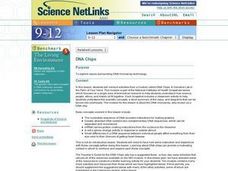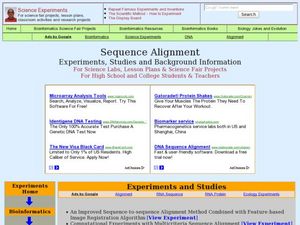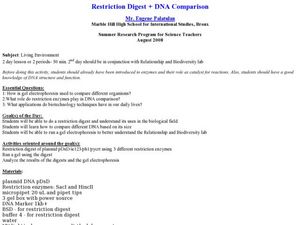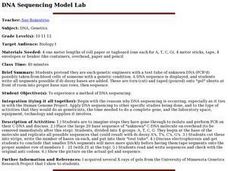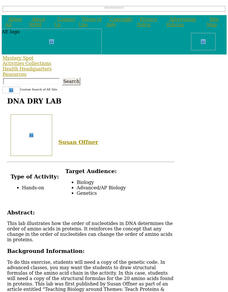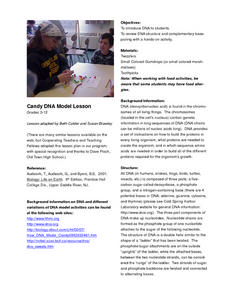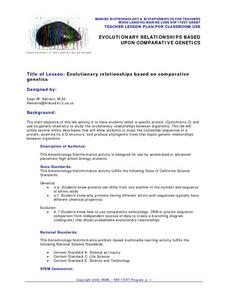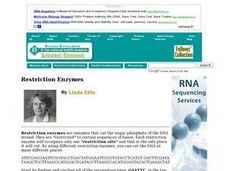Curated OER
DNA Chips
Students explore issues surrounding DNA microarray technology. They focus on a single area of biomedical research to help them explain how science, people, ethics, and history all fit together. They analyze gene-expression data.
Towson University
Chestnut Tree Lab
What will your class learn in a curious tale of a fungus, a virus, and a chestnut tree? Biology scholars discover the world of viral biocontrols through a DNA restriction lab. Groups research the decline of the American chestnut tree at...
Towson University
The Wildlife Forensics Lab
Can science put an end to the poaching of endangered species? Show your young forensic experts how biotechnology can help save wildlife through an exciting electrophoresis lab. Grouped pupils analyze shark DNA to determine if it came...
Curated OER
SAY IT WITH DNA: Protein Synthesis Tutorial
Ninth graders explore protein synthesis. In this DNA instructional activity students complete a worksheet and a DNA lab activity.
Curated OER
Sequence Alignment
Students explore the uses of sequence alignment. For this DNA lesson students complete several experiments on sequencing and algorithms.
Curated OER
My Science Box: DNA Fingerprinting
Students identify DNA in a crime scenario. For this DNA lesson, students perform paper chromatography and compare it against the pens of various suspects.
Curated OER
Restriction Digest + DNA Comparison
Students compare different DNA and run a gel electrophoresis. In this DNA lesson students complete a DNA activity that allows them to better understand its structure and function.
Curated OER
DNA Sequencing Model Lab
Students pretend they are each genetic engineers with a test tube of unknown DNA (PCR'd) possibly taken from blood cells of someone with a genetic condition.
Curated OER
DNA Dry Lab
Learners use a DNA strand to identify the component parts. They discuss an RNA molecule, protein fragments, and nucleotides. They explore how the order of nucleotides determines the order of amino acids in proteins.
Curated OER
DNA replication
Students write an essay on the basic steps of the DNA replication process accurately enough to show a complete understanding of the subject. Finally, student correctly identify the polarity of the template strand and match the correct...
Curated OER
Candy DNA Model Lesson
Young scholars explore DNA structure using materials such as Twizzlers, small colored gumdrops and/or toothpicks.
Curated OER
COMPARISON OF FOUR-, SIX-, AND EIGHT-bp CUTS IN CALF THYMUS DNA
Students use this laboratory exercise, restriction enzymes to recognize a four-, six-, and eight-nucleotide sequence. Assuming that the four component nucleotides (A, C, T, G) are distributed randomly within a DNA molecule, then any...
Curated OER
Building a DNA Molecule, Mitosis in Motion and Mutation Gossip
Students explore three lab experiments involving DNA, mitosis, and mutation. They complete activities and play games to review DNA, mitosis and mutation concepts. They build a DNA molecule and create flip cards representing mitosis in...
Curated OER
Wolves: DNA Pawprinting
Students explore and research the most widely distributed terrestrial carnivore, the wolf. They critique the true mystery of this animal and then form an opinion about this creature. The restriction-site analysis of mitochondrial DNA is...
Curated OER
Evolutionary Relationships Based Upon Comparative Genetics
Students investigate the protein cytochrome c in an attempt to use its genetic chemistry to study possible evolutionary relationships between organisms. The lesson integrates technology with the use computers to perform DNA analysis.
Curated OER
Recombinant DNA - Electrophoresis Demonstration and Problem
Suitable for an AP Biology class, the lab found here has teen bioengineers working with plasmids to clone DNA. If you have not done a similar lab, the instructions may be rather difficult to follow. Both the teacher and learner...
Curated OER
Enzyme and Southern Blotting
Students study southern blotting and its uses. They research on restriction enzymes and their uses, especially in relation to recombinant DNA. In addition, they write a summary and an interpretation of the gel.
Curated OER
The Effect of Natural Selection on Genes, Traits and Individuals
Rotating through five stations, evolutionary biologists explore the question of how changes in DNA facilitate the changes in a population over time. High-quality, colorful cards of animals, skeletons, skulls, and DNA sequences can all be...
Curated OER
Pseudogene Suite
Students use Biology Workbench to explore DNA sequence data for the GULOP gene in humans, chimpanzees, orangutans, and crab-eating macaques and the beta globin gene and its pseduogene in humans, gorillas, and chimpanzees.
Curated OER
Transcription and Translation Lab Activity
High schoolers investigate DNA strands. They study the sequence to determine if it is DNA or RNA and write the mRNA nucleotide sequence. After stringing the beads together to create the mRNA sequence they translate it into an amino acid...
Curated OER
Constructing a Phylogenetic Tree
Students are given the opportunity to analyze DNA sequence differences between organisms in order to establish a reasonable picture of the evolutionary relationships between them (Phylogenetic Tree). In the simulation form they are...
Curated OER
Restriction Enzymes
Students explore enzymes and enzyme combinations. They examine and cut up and practice matching DNA sequences.
Curated OER
DNA Coloring - Transcription and Translation
In this DNA worksheet, pupils review the transcription and translation processes. Students label and color the different parts of a DNA strand. This worksheet has 7 fill in the blank questions.
